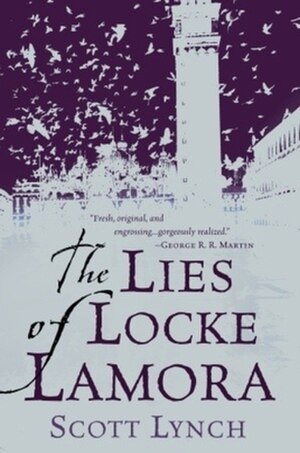With his debut novel, Lynch offered up a fairly slick caper-fantasy. Our setting is the gritty city of Camorr, a fantasy version of Venice, ruled by its Duke on the one hand and its crime boss, "Capa" Barsavi on the other. Barsavi has brought a certain equilibrium to the city through his "secret peace" that ensures that the nobility allow a certain amount of crime to go unpunished while the criminals avoid getting too greedy. Locke Lamora is a natural-born liar and thief, molded by his mentor, the false priest Father Chains, to be the Thorn of Camorr, pulling off long cons that break the Secret Peace and target the wealthy. And technically, Father Chains is an actual priest, but his patron god is the unacknowledged 13th god, patron of thieves, not the god that he professes to the public, but that's beside the point just now.
Lynch weaves together two basic timelines, a "present" story and a past story showing how Locke and the other Gentleman Bastards--Jean, the brothers Calo and Galdo, and the group's apprentice member, Bug--grew up together under Chains's tutelage and became the characters we see before us. The Gentleman Bastards are running a big con against a wealthy noble, but all this is hampered by other happenings in the city: the mysterious Grey King has entered the scene and seems intent on displacing Capa Barsavi. Locke and his Bastards are inevitably drawn into this struggle and forced to play both sides while looking for a way out.
The novel seemed to me to invite comparison with Steven Brust's Vlad Taltos series, and while The Lies of Locke Lamora kept my interest, neither the novel as a whole nor the characters seemed quite up to that standard. Locke is supposed to be some kind of thieving genius, but far too often he seemed over-matched and a bit passive. He doesn't have the panache of Vlad (nor of most other Brust characters) nor, ultimately, the same genius. Or self-control. But then, I do need to be careful: despite obvious points of comparison, I should remind myself that Lynch is not trying to create a clone of Brust's protagonist and I should work more to appreciate Locke for who he is.
One thing I'll give Lynch credit for (big-time spoiler alert--skip to the next paragraph if you're skittish about such things): he doesn't seem to hold his characters sacred. I mean, it's a bloodbath as he kills off the majority of the Gentleman Bastards. Not knowing initially that this was the first in a series, I half-suspected that this was a one-off with Locke dying at the end. That wouldn't have been a bad thing, per se, and it's to Lynch's credit that he raised the stakes that high, that he was able to generate that kind of dramatic tension.
One thing worth mentioning is the language: it's very contemporary and very coarse. I was ambivalent about it: at times, it felt jarringly modern in a fantasy setting; at times, it felt jarring just because I got tired of hearing the f-word so much (and I did hear it: I was listening to the audiobook version). At the same time, it's not as though I don't hear the same language in films without batting an eye, and I've said all such words at one time or another, so it's not a squeamishness on my part. One nit to pick is that I would have liked to have had more of a sense of language differentiation: a big part of the story revolves around disguises, but I felt like everyone talked with roughly the same level of diction, no class differences or even personal quirks. There was at times some creative swearing, but that was more Lynch showing off than anything particularly individual to a character or class.
In the end, I enjoyed it enough to see it through to the end and I enjoyed it enough to pick up the next novel in the series, but it won't go down as one of my favorites or as a novel I'd class among the best that the fantasy genre has to offer.

trying a comment...rhubarb
ReplyDeleteOK, so I can comment anonymously. Liked your analysis of the different voices, which in written text is often crucial to differentiating the characters. In the book I'm reading at home (can't remember the title right off) one character smart mouths the boss; his sidekick (who is usually the one mouthing off) says that's the way he usually talks, are you trying to sound like me? I thought it was a cleverly written passage, and the author does do a good job of giving the characters different virtual voices.
ReplyDeleteThis one sounds interesting. If it's available on Kindle, I'll download the "Sample" chapter(s)...rhubarb